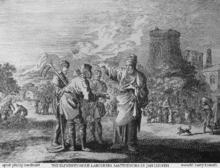Unto This Last
Unto This Last is an essay and book on economy by John Ruskin, first published in December 1860 in the monthly journal Cornhill Magazine in four articles. Ruskin says himself that these articles were "very violently criticized", forcing the publisher to stop the publication after four months. Subscribers sent protest letters. But Ruskin countered the attack and published the four articles in a book in May 1862.
The title is a quotation from the Parable of the Workers in the Vineyard.
I will give unto this last, even as unto thee. Is it not lawful for me to do what I will with mine own? Is thine eye evil, because I am good? So the last shall be first, and the first last: for many be called, but few chosen.— Matthew 20 (King James Version)
The "last" are the eleventh hour labourers, who are paid as if they had worked the entire day. Rather than discuss the religious meaning of the parable, whereby the eleventh hour labourers would be death-bed converts, or the peoples of the world who come late to religion, Ruskin looks at the social and economic implications, discussing issues such as who should receive a living wage. This essay is very critical of capitalist economists of the 18th and 19th centuries. In this sense, Ruskin is a precursor of social economy. Because the essay also attacks the destructive effects of industrialism upon the natural world, some historians have seen it as anticipating the Green Movement.[1]

The essay begins with the following verse:[2]
“Friend, I do thee no wrong.
Didst not thou agree with me for a penny?
Take that thine is, and go thy way.
I will give unto this last even as unto thee.”
“If ye think good, give me my price;
And if not, forbear.
So they weighed for my price thirty pieces of silver.”
Gandhi's paraphrase
Unto This Last had a very important impact on Gandhi's philosophy.[3] He discovered the book in March 1904 through Henry Polak, whom he had met in a vegetarian restaurant in South Africa. Polak was sub-editor of the Johannesburg paper The Critic. Gandhi decided immediately not only to change his own life according to Ruskin's teaching, but also to publish his own newspaper, Indian Opinion, from a farm where everybody would get the same salary, without distinction of function, race or nationality, which for that time, was quite revolutionary. Thus Gandhi created Phoenix Settlement.
Gandhi translated Unto This Last into Gujarati in 1908 under the title of Sarvodaya (Well Being of All). Valji Govindji Desai translated it back to English in 1951 under the title of Unto This Last: A Paraphrase.[4] This last essay can be considered his program on economics, as in Unto This Last, Gandhi found an important part of his social and economic ideas.
References
- ↑ Wall, Derek (1994), Green History: A Reader. London: Routledge, pp. 117, 122, 207.
- ↑ Unto This Last by John Ruskin
- ↑ Gandhi's Human Touch
- ↑ Gandhi, M. K. Unto this Last: A paraphrase (PDF). Ahmedabad: Navajivan Publishing House. ISBN 81-7229-076-4.